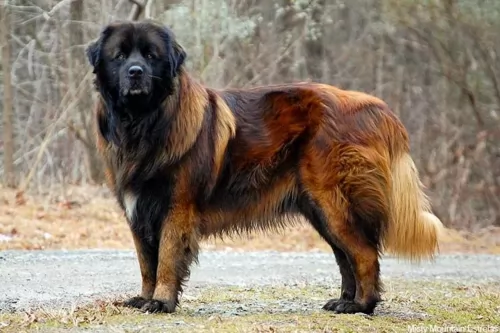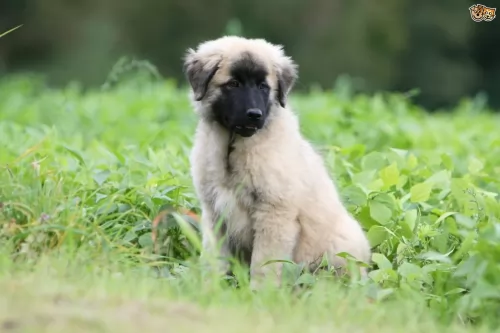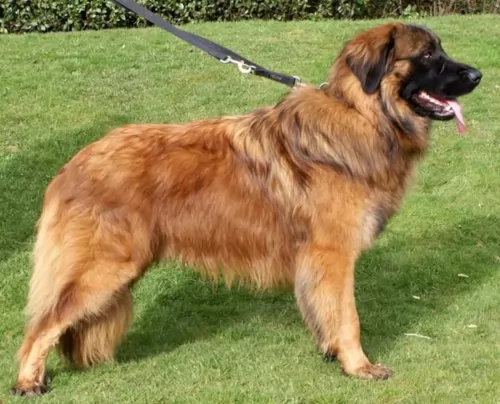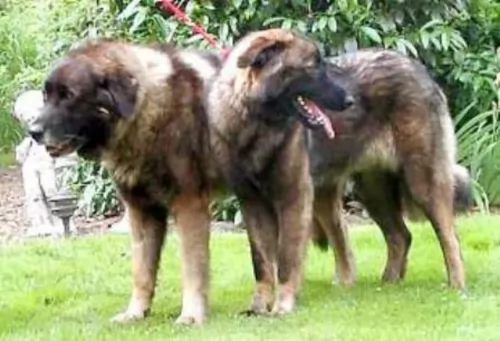 Petzlover
Petzlover Estrela Mountain Dog is originated from Portugal but St. John's Water Dog is originated from Canada. Estrela Mountain Dog may grow 19 cm / 8 inches higher than St. John's Water Dog. Estrela Mountain Dog may weigh 9 kg / 20 pounds more than St. John's Water Dog. Both Estrela Mountain Dog and St. John's Water Dog has same life span. Both Estrela Mountain Dog and St. John's Water Dog has almost same litter size. Estrela Mountain Dog requires Moderate Maintenance. But St. John's Water Dog requires Low Maintenance
Estrela Mountain Dog is originated from Portugal but St. John's Water Dog is originated from Canada. Estrela Mountain Dog may grow 19 cm / 8 inches higher than St. John's Water Dog. Estrela Mountain Dog may weigh 9 kg / 20 pounds more than St. John's Water Dog. Both Estrela Mountain Dog and St. John's Water Dog has same life span. Both Estrela Mountain Dog and St. John's Water Dog has almost same litter size. Estrela Mountain Dog requires Moderate Maintenance. But St. John's Water Dog requires Low Maintenance
 Also known as the Cao da Serra de Estrela, the large Estrela Mountain Dog from Portugal is an ancient breed, having been used for centuries to guard homesteads and livestock.
Also known as the Cao da Serra de Estrela, the large Estrela Mountain Dog from Portugal is an ancient breed, having been used for centuries to guard homesteads and livestock.
The Estrela, as a herding dog, has been developed over a long period of time because shepherds particularly wanted a dog that could survive in the mountains and be strong enough to guard livestock from predators.
The first official recorded breed standard was published in 1933, with an attempt to make the Estrela a distinct breed with a hooked tail and double dew claws.
Today the Estrela is a dog which can be found in other countries beyond Portugal, and in fact in 1973 pairs of the dogs were imported to the United States.
 The breed known as the St. John’s water dog is an extinct landrace breed. They were domestic dogs found in Newfoundland and at times were called the lesser Newfoundland. There is not much information available about the other breeds that went into its development. Hypothetically it is believed they are a mix of the Irish, Old English and Portuguese dogs bred to work.
The breed known as the St. John’s water dog is an extinct landrace breed. They were domestic dogs found in Newfoundland and at times were called the lesser Newfoundland. There is not much information available about the other breeds that went into its development. Hypothetically it is believed they are a mix of the Irish, Old English and Portuguese dogs bred to work.
It is also thought that other breeds in their family tree, descending from them, include the Golden Retriever, the Flat-Coated Retriever, the Chesapeake Bay Retriever, the Labrador and the Curly-Coated Retriever. The Newfoundland is also related to the St. Johns Water Dog through the line of Rafeirio do Alenteios that Portuguese fisherman brought to the island.
The breed was exported to England in the 19th century and early 20th. There the breeds of retrievers were developed. In Canada during this time frame restrictions were placed on dog ownership in order to encourage people to raise sheep. At the same time England imposed a long quarantine on all animals coming into the country in order to get rid of rabies. These two factors contributed greatly to the extinction of the breed. It seems the last two dogs were seen in a remote area in the 1980’s. All attempts to save the breed failed.
 The large Estrela Mountain Dog stands between 62 and 72cm and weighs between 30kg and 50kg.
The large Estrela Mountain Dog stands between 62 and 72cm and weighs between 30kg and 50kg.
The dog has 2 coat types – short and long but always coarse and thick. The coat is available in a number of colors, from fawn to gray to yellow and brindle and there can be white and black mixed throughout the coat.
The head of the dog is large and long, the neck fairly short and thick, he has dark brown eyes, a bright, intelligent expression with small, floppy ears which are set high on the skull, falling backwards against the side of the head. The tail is long and thick and the dog has a deep chest.
A large, athletic dog, the Estrela Mountain Dog is actually a calm dog, while still being protective towards his human family.
He is an intelligent dog who responds well to training and socialization. He is an independent dog, so this training and socialization is important - will be good for him, turning him into an obedient, relaxed pet who gets on well with other pets in the home as well as with children.
 St. John’s Water Dog is strong, medium sized and stocky. They looked more like English Labs than American Labs. They had a thick, short coat, loved swimming, had a lot of endurance and rudder tail. It was also described as a thin, black dog with short hair. They had white patches on their chest and feet. His nose was thin and tapered, his legs powerful, his chest muscular. The breed is quick, swims, runs quickly and is a fighter as well.
St. John’s Water Dog is strong, medium sized and stocky. They looked more like English Labs than American Labs. They had a thick, short coat, loved swimming, had a lot of endurance and rudder tail. It was also described as a thin, black dog with short hair. They had white patches on their chest and feet. His nose was thin and tapered, his legs powerful, his chest muscular. The breed is quick, swims, runs quickly and is a fighter as well.
Never accepted by any major kennel club except as a foundation breed. They became extinct.
 The Estrela Mountain Dog loves his human family and takes guarding them and protecting them seriously. He is a strong willed, independent dog that will require training and socialization. He makes an excellent pet, and is calm and gentle with children.
The Estrela Mountain Dog loves his human family and takes guarding them and protecting them seriously. He is a strong willed, independent dog that will require training and socialization. He makes an excellent pet, and is calm and gentle with children.
The Estrela Mountain Dog has so much going for him – he is beautiful to look at, he is loyal and protective with his human family, he is intelligent, loving and a healthy type of breed, and he is just waiting to become a member of your family.
 The Estrela Mountain Dog can live to be between 10 and 14 years of age, but as with any large dog, he will have a tendency to suffer from hip- and elbow dysplasia.
The Estrela Mountain Dog can live to be between 10 and 14 years of age, but as with any large dog, he will have a tendency to suffer from hip- and elbow dysplasia.
Dilated cardiomyopathy is another common heart failure disease found particularly in large-breed dogs. The Estrela is prone to this disease and you’ll notice he has shortness of breath, abdominal swelling and coughing. The disease may not be curable, but there are certainly treatments for it.
 There is no documented history of any genetic or hereditary illnesses in the breed. However, it seems rational to believe they suffered from ailments similar to Labradors and newfoundland though they are smaller dogs.
There is no documented history of any genetic or hereditary illnesses in the breed. However, it seems rational to believe they suffered from ailments similar to Labradors and newfoundland though they are smaller dogs.
 The Estrela Mountain Dog is a large dog and thankfully, when it comes to feeding him, experts in dog feeding have come up with commercially manufactured dog feeds that particularly cater for a dog’s age, his size and any illnesses he may have.
The Estrela Mountain Dog is a large dog and thankfully, when it comes to feeding him, experts in dog feeding have come up with commercially manufactured dog feeds that particularly cater for a dog’s age, his size and any illnesses he may have.
As a large dog, your Estrela Mountain Dog can suffer with joint problems such as hip dysplasia. For hip dysplasia you want to be looking at a dog food for large dogs which contains joint-health ingredients. An ingredient in the dog food such as glucosamine can work to reduce the damage brought about by hip dysplasia.
Mix in some cooked brown rice, vegetables and chicken into his kibble from time to time. You want your pet to live a long, healthy life and raw meat added in occasionally can increase your pets energy levels, reduce the risk of joint disease and ensure a shiny, soft coat. Raw meat can provide iron, zinc, vitamins, minerals and potassium.
The Estrela isn’t a huge shedder, but his beautiful, thick coat will require brushing twice a week. It’s your chance to check him over for fleas and ticks as well, and the entire grooming process – checking his ears, nails and teeth – is an excellent bonding experience for you and your canine friend.
The Estrela may be large, but he is fairly calm. He’ll love to join you on your daily walks or for a ball game in the garden. He can adapt to life in the city or the country, but his big size will mean he isn’t suited to a tiny property.
 1Feeding the puppy – Don’t overfeed – they have a propensity toward obesity. Feed high quality, high protein 3 x a day.
1Feeding the puppy – Don’t overfeed – they have a propensity toward obesity. Feed high quality, high protein 3 x a day.
2.Feeding the adult – Don’t overfeed. Feed a high quality, high protein 1-2 x a day.
4. Games and Exercises – They need space to run and they love to explore. They would also love to be near water where they could swim. Good at dock diving, field trials, flyball and frisbee.